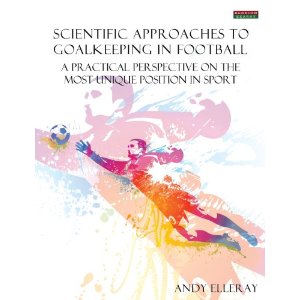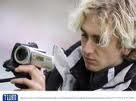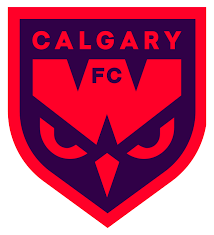Andy Elleray has written a number of articles for this site so with the launch of his new book I thought we could do a quick catch up and find out all about it.
 RC: Writing a book is no small task – what made you want to do it in the first place?
RC: Writing a book is no small task – what made you want to do it in the first place?
AE: Yeah I’ll say I didn’t realise the effort and dedication needed to finish something like this!
I wanted to put across my experiences within goalkeeping, from a playing, coaching and performance analysis point of view.
There’s a distinct lack of research and new theories within goalkeeping – I wanted to bring to light areas I’ve been working on over mainly the past 5/6 years and how different environments I’ve been a part of have shaped current philosophies.
With a lack of academic and scientific research available some areas of the book are a start, but by no means the finished product as I’ve looked to open upon potentially neglected strands of goalkeeping – namely biomechanics and performance analysis.
RC: Who is the book aimed at?
AE: It is, of course aimed at anyone within goalkeeping, mainly up to 18, so that would be coaches looking for new ideas, goalkeepers looking to understand the position and anyone looking to add something extra to their goalkeeping training programme.
From an analysis point of view there are defiantly areas that are transferable to all situations, like the feedback sections and tips on how to use software packages and varying cameras etc. The iPad section may open up some thinking for training session analysis.
RC: You have always tried to blend your skills as a goalkeeping coach and as an analyst does this book do the same?
AE: Yeah the book harnesses the interaction between all my roles and shows how, as a coach, you can utilise various performance and video analysis methods on a daily basis – giving account to time, resources, and of course how to best feedback in differing situations.
It’s all about the feedback – it’s relatively easy to get footage these days, but how you relay the messages you want to make as a coach is vital. From an analyst point of view you need knowledge of the environment you’re working in, so all coaches should be analysts, whether it’s immediate verbal feedback, or indeed video everything should be inter-linked.
From my point of view being able to work with a small, specific group is far easier than a coach with a squad of 20 players.
RC: Can you give us an outline of what type of topics you cover in the book?
AE: The full chapter lists are on the publishers website (www.bennionkearny.com) but I’ve tried to cover main sections of performance – so psychology, physiology, biomechanics, and performance analysis, with some help from a couple of specialists within certain fields. After this I’ve looked into alternative practice structures, some of my research, and then training methodologies from around the World – along with vision and awareness and goalkeeping innovation.
RC: You have always to back up your coaching with scientific research; does the book include some of the research you have done?
AE: I’ve put in one of my presentations from the 2012 ISPAS World Congress on goalkeeping – which offers suggestions on what to prioritise in training after analysing match actions. I’ve also put a few other unpublished pieces that are quite basic but look to pose a few questions along the way. I’ve got tons more ideas, and plans in place to expand on a lot of the chapter content within the book – as I believe this is only the tip of the iceberg.
All the chapters pave the way for the final 3 chapters which is my own coaching theory titled ‘Games Based Goalkeeper Training’ which is all based around the TGfU (Teaching Games for Understanding) model. Without going into masses of detail the theory looks to bridge the gap between isolated technical practices and whole team based practices. The creation stemmed from my research and by analysing current practice to try and come up with solutions to common issues – such as, how do I get my goalkeeper moving more athletically? and, my goalkeeper is brilliant in my sessions but struggles with the team, how can I aid this transition? So basically I’ve seen an issue and tried to come up with a solution!
RC: Do you think in the future we will see more analysts who specialize on a particular area like GK?
AE: I would like to think so. Being at University you can really dedicate your time to building up a good set of skills and focus on what you enjoy. I was a goalkeeper, who coached goalkeepers so it was a pretty natural transition to move into this field. But specific attack analyst or defence analyst in football who knows. The discipline is ever growing so who knows what the future will bring in terms of specific roles.
What I would say is that more work needs to be done educating coaches how to best use video within their practices and how to best feedback information. I’d also love to see more research done into the analyst/coach relationship as well as it’s a fascinating dynamic. Anyone who wants to contact me about the book, or ask any questions please use satgif@gmail.com
To learn more and purchase this book check out these links.
Amazon site:
http://www.amazon.co.uk/Scientific-Approaches-Goalkeeping-Football-Perspective/
Publisher’s site:
 About Andy: Andy Elleray is a self-confessed goalkeeping fanatic having worked at all levels of football – within coaching and performance analysis. He holds an honours degree in Sports Science and a Master’s degree in Sports Coaching, he is a UEFA qualified coach and holds the highest accreditation as a performance analyst through ISPAS (The International Society of Performance Analysis of Sport).
About Andy: Andy Elleray is a self-confessed goalkeeping fanatic having worked at all levels of football – within coaching and performance analysis. He holds an honours degree in Sports Science and a Master’s degree in Sports Coaching, he is a UEFA qualified coach and holds the highest accreditation as a performance analyst through ISPAS (The International Society of Performance Analysis of Sport).
Andy has worked at a variety of different professional clubs and within some highly esteemed academies. Assisting top level coaches and creating numerous goalkeeper coaching support and coaching systems, he also conducts goalkeeping research and has previously spoken at high profile goalkeeping conferences and the World Analysis Congress where his research, ideas and approach have been well received.










